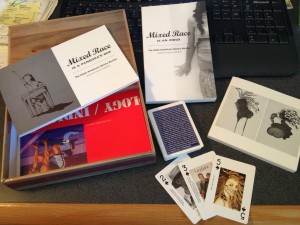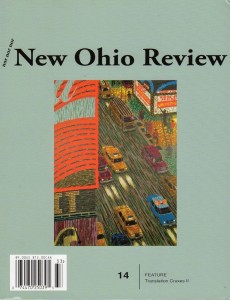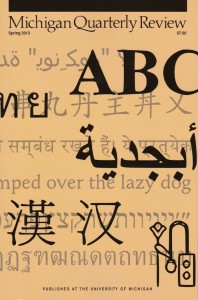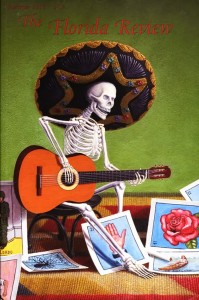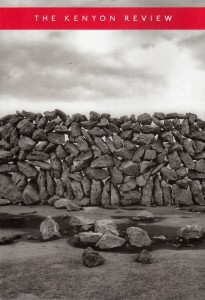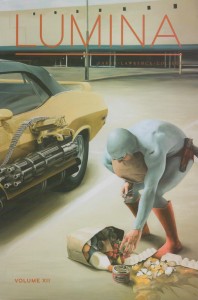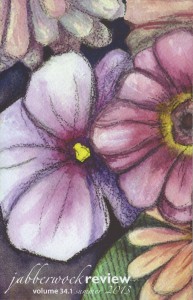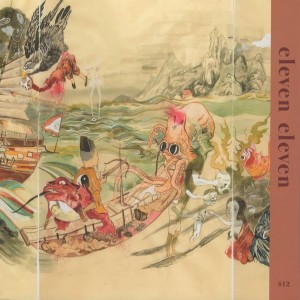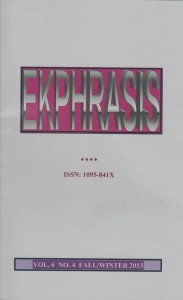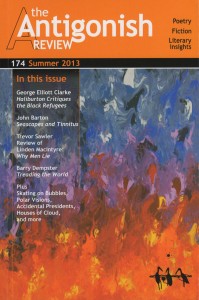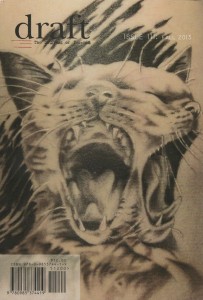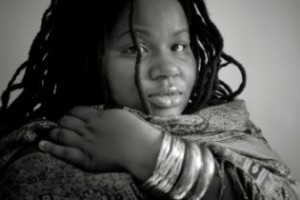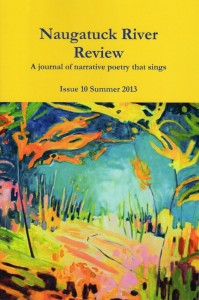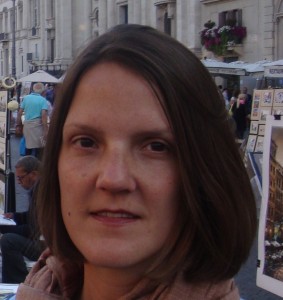In case you missed them last week, check out our new batch of book reviews for October! Fourteen new titles were covered, spanning poetry, fiction, and non-fiction. Find some great new fall reads, and look for next month’s book reviews on November 1.
NewPages Blog
At the NewPages Blog readers and writers can catch up with their favorite literary and alternative magazines, independent and university presses, creative writing programs, and writing and literary events. Find new books, new issue announcements, contest winners, and so much more!
Raymond Carver Short Story Winners
There were more than 1,000 entries to Carve Magazine‘s Raymond Carver Short Story Contest. The top five winning pieces are printed in the latest premium edition and online; they will also be sent to three literary agents for review and representation consideration.
First place – $1000
“Tu quoque” by Jake Andrews in Cambridge, United Kingdom.
Second place – $750
“No Translation” by Mona Awad in Manhattan, NYC.
Third place – $500
“Heisenberg” by William Shih in Queens, NYC.
Editor’s Choice (Matthew Limpede) – $250
“The Gymnast” by Jennifer Harvey in Amsterdam, Netherlands.
Editor’s Choice (Kristin S. Vannamen) – $250
“Twenty-Nine Ingredients” by Lesley Quinn in Oakland, CA.
Spread the word!
Mixed Race in a Box
The Asian American Literary Review‘s latest issue is more than just a magazine, it’s a package, it’s a box, literally. Packaged in a box titled “Mixed Race in a Box” are a deck of cards (the back featuring quoted excerpts and the face side, art), a poster, and three bound books: “Mixed Race is a Black Box,” “Mixed Race is an Inbox,” and “Mixed Race is a Pandora’s Box.” Certainly eye-catching, it’s an important issue.
As part of the Mixed Race Initiative, this special issue on mixed race “is not simply a reexamination of race or a survey of mixed voices, important as both are,” say the editors of AALR. “We envision our role as that of provocateur–inspiring new conversations and cross-pollinations, pushing into new corners. All contributions to the issue are collaborative, ‘mixed’ in nature, bringing together folks across racial and ethnic boundaries, across disciplines, genres, regions, and generations. We solicited work from artists and writers, historians and activists, race scholars and filmmakers, teachers and students, among others. The idea is a network of original projects that not only map out multiracialism past and present but also break new ground”
Learn more about the project on their website.
Spread the word!
New Ohio Review Writing Contest Winners
The Fall 2013 issue of New Ohio Review features the winners of their fiction and poetry contests for 2013:
Fiction (selected by Stuart Dybek)
First Prize: Brian Trapp, “The Best Man”
Second Prize: Bradley Bazzle, “Crimes of the Video Age”
Poetry (selected by Barbara Hamby)
First Prize: Michael Derrick Hudson, “Feeling Sorry for Myself While Watching a Really Bad World War II POW Movie on TV”
Second Prize: George Kalogeris, “Ambassador of the Dead”
Spread the word!
Michigan Quarterly Review: Translation Issue
The most recent Michigan Quarterly Review is a special translation issue. “We bookend the issue with two stories devoted to translation as an act and translation as a geopolitical reality in a world of many borders as well as languages,” the editors say. “We have gathered translations from a host of figures—scholars, critics, poets, novelists—and have reprinted the originals in the original language, not to prove our scholarly bona-fides, but to emphasize translation in yet another sense, the shuttling between different alphabets—let’s translate that word into less loaded ones, like “written symbol-systems”—which manifest different appearances to the reader. The hope is not that readers will instantly turn to their Tibetan or Persian or Hebrew or Greek dictionary and cry—aha! I prefer this or that word or locution, but rather sense the arbitrariness of the English-sign-and-symbol system that our extraordinarily learned translators are bringing to bear on their efforts.”
The issue features Gendun Chopel (Donald S. Lopez, Jr.), Euripides (Anne Carson), Ghalib (M. Shahid Alam), Odi Gonzales (Lynn Levin), Anna Herman (Adriana X. Jacobs), Omar Khayyam (Juan Cole), Irma Pineda (Wendy Call ), Sohrab Sepehri (Kazim Ali and Mohammad Jafar Mahallati),Charles Baxter, Tom Earles, Patricio Pron (Kathleen Heil), Jorge Semprun (Sara Kippur), and more.
Spread the word!
First Jeanne M. Leiby Chapbook Award
The Florida Review, Volume 37 Number 1, announces and publishes the winners of the first Annual Jeanne M. Leiby Chapbook Award. “We began this award in honor and memory of Jeanne M. Leiby, who edited TFR before becoming the first woman editor of The Southern Review,” writes Editor Jocelyn Bartkevicius. “Her tragic death in a car accident left the writing community in Central Florida and across the country deeply saddened. . . . We were honored to have David Huddle, long-time mentor and friend of Jeanne’s, as our judge . . .”
The winning piece “Rubia” by Patricia Grace King does not appear in the journal because it has been published as a chapbook, but it can be purchased through The Florida Review‘s website. The two finalists’ pieces appear in the issue: “Foreign Service” by Julia Lichtblau and “The Geometry of Children” by M. R. Sheffield.
Spread the word!
Glimmer Train July Very Short Fiction Winners :: 2013
Glimmer Train has just chosen the winning stories for their July Very Short Fiction competition. This competition is held twice a year and is open to all writers for stories with a word count not exceeding 3000. No theme restrictions. The next Very Short Fiction competition will take place in January. Glimmer Train’s monthly submission calendar may be viewed here.
 First place: Kimberley Bunker, of Brooklyn, NY [pictured], wins $1500 for “Number 41.” Her story will be published in Issue 92 of Glimmer Train Stories. This will be her first print publication.
First place: Kimberley Bunker, of Brooklyn, NY [pictured], wins $1500 for “Number 41.” Her story will be published in Issue 92 of Glimmer Train Stories. This will be her first print publication.
Second place: Analisa Raya-Flores, of Los Angeles, CA, wins $500 for “The Boys Like Bones.” Her story will also be published in an upcoming issue of Glimmer Train Stories, increasing her prize to $700.
Third place: Natasha Friedman, of Orem, UT, wins $300 for “The Holy Spirit Descends Over Kansas.”
A PDF of the Top 25 winners can be found here.
Deadline soon approaching! Fiction Open: September 30.
First place prize has been increased to $2500 for this competition. It is held quarterly and is open to all writers. No theme restrictions. Most submissions to this category are running 2,000-6,000 words, but up to 20,000 are welcome. Click here for complete guidelines.
Spread the word!
Miniature Moments in My Daily Life
Laurie McCormick’s collection of photography titled “Miniature Moments in My Daily Life” is featured in the Fall 2013 issue of Still Point Arts Quarterly. She creates everyday scenes with miniature people. She writes, “A few years ago, I heard someone say, ‘Photograph what you love and where you are.’ Something clicked, and I found myself creating and photographing scenes using my collection of miniatures. My collection had been stuffed away for years in a closet, and freeing them brought me tremendous joy. The work presented here . . . comes from scenes reflective of my daily routine.
She has another collection titled “Family Secrets” which focuses on some “painful memories” from her childhood. “I find this work with miniatures to be very therapeutic because of my feelings uncovered in creating these scenes,” she writes. “This work has enabled me to put the past behind me and enjoy the creativity of the moment.”
You can view some of her work at the Still Point Arts Quarterly online gallery, and see more inside the recent issue.
Spread the word!
Dark Times Filled with Light
Dark Times Filled with Light is a brilliant collection of poems, spanning four decades, by Argentinean poet Juan Gelman. Virtually unknown to English-speaking literary audiences, Gelman is the recipient of relatively recent international acclaim, including a Cervantes Prize and Argentine National Poetry Prize, and his work continues to be translated into English. More impressive, however, than Gelman’s vitae is the sheer poetical power and pull of his work. Gelman’s poetry negotiates the boundaries between politics and history, between voice and borders, and gives an enigmatic narrative thread to the life and times of a poet in exile. It is impossible to not appreciate the sophistication and pathos that is etched in the work. Continue reading “Dark Times Filled with Light”
Spread the word!
Duplex
Kathryn Davis begins her novel Duplex with a tableau of children at play at summer’s end on a safe suburban street at dusk. Perhaps this is the early 1960s: no internet, television watched on a “console.” To immediately insert into this landscape robot neighbors and a Mephistophelean sorcerer complicates suspension of disbelief. Questions arise: if this place is not what it seems, what is it? What are the rules here? Who’s making the rules? Continue reading “Duplex”
Spread the word!
Moth
Moth; or, how I came to be with you again, by Thomas Heise, is a poetic narrative of three- to six-page chapters, by a fictional narrator writing his memoir who “may” be under doctor’s care for an illness in which he is unable to distinguish between “what was real and what was not”—a condition the doctors were so concerned about that perhaps “they might be diagnosing themselves.” These prefatory remarks likewise state that the manuscript had been lost and found and perhaps altered by himself or another and, once translated from the German into English, the original was burned. The book begins with an unreliable narrator and text. Continue reading “Moth”
Spread the word!
The Virtues of Poetry
Critic and poet James Longenbach has a mission: to call writers back to the study of great poems. Although this mission has motivated Longenbach’s critical writing previously, it comes through most clearly in his newest book, The Virtues of Poetry, a series of twelve essays that each consider the qualities a successful poem might possess. Weaving together research, close reading, and unmitigated passion for the poems and poets he admires, Longenbach’s arguments prove convincing and insightful in this lively essay collection. Continue reading “The Virtues of Poetry”
Spread the word!
Portuguese
Witty to no end, Brandon Shimoda writes smart-ass hipster poems. The title of his latest collection, Portuguese, stems from a first day of first grade childhood teasing incident on the school bus when he was mocked by a “a fourth grader, skinny, with grassy blond hair and the face of a horse” who drawled out “in a squealing voice, Portugueeese, Portugueeese!” Shimoda is not in the least Portuguese. However, the incident not only gives him the title of this collection but clearly shapes the irony and humor that run throughout, along with for better or worse contributing to his larger views regarding humanity. One way or another, the event led as well to his researching “words of Portuguese origin introduced into the Japanese language, mostly by Portuguese Jesuit priests.” The list is a curious wonder in itself, at once as much practical as fanciful: Continue reading “Portuguese”
Spread the word!
Birds of Paradise Lost
While reading Andrew Lam’s Birds of Paradise Lost, I kept thinking of novelist Chimamanda Ngozi Adichie’s TED speech, back in 2009. It was titled “The Danger of the Single Story”; the subject echoed the project of challenging master narratives from the previous century. That challenge germinated revisions in university reading lists, back in the late seventies, as the war in Vietnam approached its final phase. Adichie underlines the role of power cultivated in a single story, and how it insinuates, then calcifies, subterranean borderlines through stereotypes. On a Virgin flight from Lagos before her talk, Adichie heard an announcement about charity work in “India, Africa, and other countries”; however unintentional this categorization of Africa as a country was, the remark was not isolated. Adichie was clear about that, that the comment signaled pernicious perceptions about Africa, the kind that framed the continent in a stereotype: that its economic situation is prime destination of numerous charities from the First World. On the other hand, Adichie’s problem with stereotypes “is not that they are untrue, but that they are incomplete[;] they make one story the only story.” Continue reading “Birds of Paradise Lost”
Spread the word!
A Wild Surmise
The beauty of a “new and selected” book is that it can provide a wide-ranging introduction to readers unfamiliar with a poet while serving to remind familiar readers of all the reasons they loved the poet’s work in the first place. The risk sometimes is that drawing from a poet’s entire career can yield too diverse a book, one which lacks cohesion. That is not the case in A Wild Surmise. Although it includes poems from throughout Healy’s long career, the tone of the book is consistent—from the opening acknowledgments to the closing poem, the tone is celebratory, grateful, and entirely current. Whether a reader is already familiar with Healy’s work or not, the poems are engaging, the presentation is savvy, and the subjects (love, death, nature, urban life) are both timely and timeless. Continue reading “A Wild Surmise”
Spread the word!
Diadem
Despite a several-decades-long history of publication in the poet’s homeland of Uruguay, prior to the publication of Diadem: Selected Poems the only published translations into English of Marosa Di Giorgio’s work were her 1965 collection The History of Violets (Historial de las violetas) (Ugly Duckling Presse, 2010) and a selection of her work in the anthology Hotel Lautréamont: Contemporary Poetry from Uruguay (Shearsman, 2011). This is slim representation for a poet who, as translator Adam Giannelli relates in his introduction, “like Whitman . . . expanded the same work throughout her career,” ultimately gathering fourteen books as her collected poetry in Los papeles salvajes (“The Wild Papers”) which in “the most recent version appeared in 2008, and gathered in a single volume nearly seven hundred pages of poetry.” Continue reading “Diadem”
Spread the word!
Belmont
While it is generally a mistake to assume the speaker of a poem is the poet himself, Belmont is an introspective book featuring many overtly autobiographical gestures. Taking its title from the Massachusetts town where poet Stephen Burt lives, the collection explore the pleasures of adulthood and the security of home through poems that are fixed in definite times and recognizable places and often refer to specific people. Objects, even, have specificity; in “Over Wingaersheek Beach,” readers are told that “Nathan’s kite shows a pattern of angelfish, coral, and sea stars,” taking the vivid description so far as to denote possession—the kite in question is Nathan’s—and in fact Nathan and other family members are mentioned by name frequently in the book, lending the collection the narrative specificity of a memoir. Continue reading “Belmont”
Spread the word!
A Constellation of Vital Phenomena
Against the background of bad press about Chechnya—from violent rebel attacks like that on a Moscow theater and, more recently, the Chechen connection with the Boston Marathon bombers—Anthony Marra’s novel A Constellation of Vital Phenomena manages to right the balance on Chechen/Russian violence. For those of us who know little about the Chechens’ struggle for independence, from the first page on, we see the brutality of the “Feds” (the Russians) and their continuing efforts to obliterate any chance of the country’s unification. The two main female characters, sisters Natasha and Sonja, are Russians; their family was encouraged to move to Chechnya to help keep the country Russian. Continue reading “A Constellation of Vital Phenomena”
Spread the word!
Dissident Gardens
Dissident Gardens begins in Queens during the post-war years, when the romance with Communism was still fresh. There was a brief window of time before McCarthyism when, as Allen Ginsberg wrote in his famous poem America, “everybody was angelic and sentimental about the workers it was all so sincere you have no idea what a good thing the party was . . .” In some circles, revolution was in the air. There were cell meetings, communiques from Moscow, Bolsheviks in the bathroom. However, the narrative informs us: Continue reading “Dissident Gardens”
Spread the word!
Patterns
The Swedenborg Foundation’s annual Chrysalis anthologies were first published in 1984, for the purpose of examining themes related to the universal quest for wisdom according to the teachings of scientist-turned-spiritual-visionary and writer Emanuel Swedenborg. This, the final volume of the series, contains essays, stories, poetry, and illustrations focused on the theme of patterns. It contains more than seventy pieces and numerous illustrations by poet laureates and prominent and award-winning authors, as well as some new voices, and is divided into five sections: “Breaking Patterns,” “Perpetuating a Pattern,” “Stuck in a Pattern,” “Patterns in Progress,” and Making New Patterns,” in addition to the preface and epilogue. Continue reading “Patterns”
Spread the word!
All Standing
All Standing is history with a pulse. Kathryn Miles, in a heroic feat, attempts to unravel the threads that lead to the success of the Jeanie Johnston, a famous Irish famine ship that never lost a passenger. Continue reading “All Standing”
Spread the word!
The Wife of Martin Guerre
Life choices were nonexistent for Bertrande Guerre (née Rols) in sixteenth century France. Her marriage to Martin was arranged between their wealthy peasant families when they both reached puberty. A distant husband, Martin grudgingly comes to respect Bertrande when she sides with him against his cruel father. To prove her love, she covers for Martin when he runs away. “Eight days” turns into eight years, and Martin returns a changed man . . . that is, if it really is him . . . Continue reading “The Wife of Martin Guerre”
Spread the word!
Patricia Grodd Poetry Prize for Young Writers
The introduction to the Patricia Good Poetry Prize for Young Writers in the latest issue of The Kenyon Review states that the prize, “now in its tenth year, recognizes an outstanding single poem by a high school sophomore or junior . . . As always, we are grateful to Ms. Grodd for endowing this series, which would not be possible without her generosity. We are also consistently impressed by the initiative and passion of all the young poets who submit their work, and we are thrilled to present the following three commanding and inventive poems to our readers.”
First Prize Winner
Ian Burnette: “Full Blood”
Runners-Up
Alicia Lai: “Saung”
Anne Hucks: “Mobile”
In this issue, you can also find new stories by T.C. Boyle, Robert Coover, and Alex Miller; “Captain Robert Bly, Ortega Y Gasset, and the Buddha on the Road” by Mark Gustafson; and more poetry, stories, and essays.
Spread the word!
Tupelo Press Offers Fellowships for Workshop
The Tupelo Press Board of Directors has generously offered four $250 fellowships to the October Intensive Workshop in the Round conference, on a first-come, first-served basis.
From Tupelo Press:
It’s autumn, the season for new submissions. We’ve heard your request for help getting your poems ready to send off to the journals and presses that are right for you. We hear that what you need is to have editor’s and publisher’s eyes on your work, first and foremost, to better understand what editors and publishers want, and to help you get your poems to that place, whether you’re heading toward a full-length manuscript for the new contest season, or preparing individual poems for submission to literary journals.
So, we’re offering this intensive poetry conference and workshop: Friday, October 25th through Monday, October 28th (with extended stay option).
Held in the glorious Round House in the foliage-resplendent Berkshires, this conference offers a traditional format, intensely focused on revision for publication: from Friday evening through Monday morning we will work on 15 of your best poems, concentrating on the arts of revision and individualized strategies for submission and publication.
To apply for a fellowship, please inquire at the time of application.
For details on locations, requirements and cost, please visit: http://tupelopress.wordpress.com.
You may also:
Call: (413) 664-9611
Email: [email protected]
Write: Tupelo Press Seminars
243 Union Street #305, The Eclipse Mill
North Adams, MA 01247
Spread the word!
Lit Mag Covers :: Picks of the Week
Take a look at these covers that came in this past week!
What’s not to love about this cover of Lumina? I mean, how often do you see a superhero out grocery shopping, much less dropping his bags on the ground? Titled “Shopping,” this piece is done with oil on canvas by Andreas Englund.
This issue of The Jabberwock Review made the girl in me go, “ooo, pretty!” I couldn’t find the name of the artist who designed or drew this, but it sure is eye-catching!
And as with most covers of Eleven Eleven, I’m not quite sure what to say, not sure if I should be fascinated or grossed-out. The cover art, which wraps to the back of the issue as well, is titled “Dead Sea” by Howie Tsui.
Spread the word!
2013 Ekphrasis Prize
Editors Laverne and Carol Frith announce in the latest issue of Ekphrasis that the winner of the 2013 Ekphrasis Prize is Susanna Rich of Blairstown, NJ for “Shoes Along the Danube Promenade.” Here are the first few stanzas:
Budapest, 2005, sixty years
past Hitler’s blitzkriegs, death camps,
and the Hungarian Arrow Cross Militia
lining up and roping together Jews
to face the red river that received them
as they were shot (the body tipping forward,
the falling away from tight eyes).
Sixty pairs of cast iron shoes are anchored
into the concrete embankment . . .
Spread the word!
Editorial Changes at The Antigonish Review
The Summer 2013 issue of The Antigonish Review starts out with a note of thanks. Ellen Rose and Tony Tremblay are retiring as editors of Essays/Articles after thirteen years of work. And after an anecdote of a grad school prank, the new section editor, Tony Fabijančić, writes, “I want to shift the emphasis slightly from the cerebral to the visceral, to the guts of experience, the heat of the sun, dust of the road, without shutting the door on intellectual works, interviews with Canadian literati, and the like. Writers of travel sketches, personal memoirs, other essays which fall under the rubric of creative nonfiction, provided they aren’t boring, don’t descend into sentimentality and are polished gem-hard writing-wise, will always be welcome. Within these general parameters the possibilities are endless…”
The issue features work from George Elliott Clarke, John Barton, Trevor Sawler, Barry Dempster, and more, plus “Skating on Bubbles, Polar Visions, Accidental Presidents, Houses of Cloud, and more.”
Spread the word!
draft Goes Through Drafts, Too
draft, “The Journal of Process,” is now in it’s third issue, and as it is a magazine that publishes drafts of the writing process, it also goes through its own changes:
- In the first issues, they’ve published poetry and fiction. In this one, they’ve now added nonfiction. “We’re very pleased to have early and final drafts of Joe Wilkins’ essay ‘Growing Up Hard’ which was first published in Orion Magazine and a finalist for a 2010 National Magazine Award in the Essay category.
- In addition to the interviews that follow, they have added author comments to the drafts. “As you read this issue’s story by Roxane Gay, you’ll find markers in the margin flagging types of edits. These notes will point to where an edit has been made and what kind . . .”
- Lisa Ciccarello has been added as the poetry editor. Current editorial board Rachel Yoder and Mark Polanzak say, “we are blown away by the insight she brings with her knowledge and love of poetry.”
Spread the word!
CFP: Undergrad English Conference
The University of St. Francis is now accepting scholarly papers from undergraduate students for their 23rd Annual English Language and Literature Conference Saturday, March 15, 2013 in Joliet, Illinois. This event is open to all undergraduate students. Organizers are calling for any paper related to English language, literature, film, critical theory, or creative writing (one paper per applicant). If your paper is accepted, you will present it to fellow students from all around the country. The deadline is December 15th.
Spread the word!
150 Post Grimm
September 20 of this year marks 150 years since the death of Jacob Grimm, who died four years after his younger brother Wilhelm. Morgan Mies in his post The Storytellers (The Smart Set, Drexel University), takes a look at our fascination, and sometimes disgust, with these brothers and their story collecting. She makes this comment after acknowledging accusations that Grimm’s were “early forerunners of a German nationalism that eventually turned into Nazisim”:
Whether or not those accusations are justified, the Brothers Grimm saw folktales and legends as absolutely essential material for the formation of any kind of cultural identity, good or bad, fascist or anti-fascist. The Brothers Grimm believed that folktales are fundamental. That’s because folktales and legends express root fears, anxieties, wishes, passions, desires, and regrets. Reading the folktales of a specific people is like reading an individual’s private diary. It is not that the diary is necessarily truer than, say, the person’s public correspondence. But the private diary is certainly more raw and less filtered. Jacob and Wilhelm Grimm felt that the German people would wake up to themselves if given the opportunity to read their own collective diary.
Spread the word!
2013 Hudson Prize Winner
Each year Black Lawrence Press awards The Hudson Prize for an unpublished collection of poems or short stories. The prize is open to new, emerging, and established writers. The winner of this contest will receive book publication, a $1,000 cash award, and ten copies of the book. Prizes awarded on publication. Black Lawrence Press has announced the winner of the 2013 Hudson Prize: PATIENT. by Bettina Judd [pictured]. In addition, the judges were so impressed with the submissions for this year’s prize that they’ve offered a contract to another finalist, Brandi George.
Spread the word!
“How She First Discovered Sex”
In Naugatuck River Review‘s Summer 2013 issue, the editors write, “In this, the 10th issue of Naugatuck River Review, the reader will find the continuation of what is fast becoming a tradition of publishing great modern narrative poetry. Poets in this issue . . . will surprise and inspire all who enter these pages.” They invite the reader in by placing Nancy Chen Long’s poem “How She First Discovered Sex” at the beginning. Here’s a sample:
“Only grown-ups can do it. Kids aren’t allowed to. Even in second grade,
she understood there were things her parents couldn’t tell her until she
was older. But it was Saturday night, and again there were giggles
and rustling noises coming from her parent’s bedroom . . .
. . . Candy wrappers strewn all
about the bed, her mom and dad propped up against pillows, chuckling and
munching, reading the Sunday funny papers . . .
. . . Seeing her at the door, her mom patted the bed. Hop
on up, sweetie. And she did, snuggled in between her parents as they
read the funnies to her, shared Almond Joys, licorice twists, Tootsie Rolls.
So this is sex, she thought, eating candy in bed. One of those fun things
only grown-ups are allowed to do.“
Spread the word!
Miscellaneous Literary Sites on NewPages
Our literary magazine guide is one of our most visited and popular pages on our site, but did you know that we also have a Miscellaneous Literary Sites page? It has a lot of neat sites full of literary delight, ones that are like magazines but don’t necessarily fit the same mold. Most of them still look for contributing writers just as magazines do, so check them out writers! And readers, there’s definitely some fun stuff to read here.
For example, we recently added tinywords.com to this list, which originally started in 2000 as a daily haiku delivered by SMS to cell phones, then eventually to an RSS Feed and Twitter account. You can subscribe on their website to receive daily poems in the form of haiku, tanka, quintains, and unclassified “micropoems.” How fun! You can also read a collection of these compiled on their website and in their Twitter feed.
Spread the word!
2013 Booth Story Prize
The results are in for the 2013 Booth Story Prize, and Lenore Myka has reason to celebrate. Selected for first prize with “Real Family” by judge Roxane Gay, Myka received publication as well as $1,000. Here’s all about her: “Lenore Myka’s fiction was selected as one of the 100 Distinguished Stories by The Best American Short Stories and won the 2013 Cream City Review fiction contest. Her work has appeared in Alaska Quarterly Review, West Branch, Massachusetts Review, H.O.W. Journal, upstreet Magazine, Talking River Review, and the anthology Further Fenway Fiction. She received her MFA from Warren Wilson College.” You can read this winning piece on Booth‘s website.
And here’s the complete list of winners:
Winners
1st Prize: ”Real Family” by Lenore Myka
2nd Prize: ”Little Miss Bird-in-Hand” by Annie Bilancini
Shortlist
“Some Helpful Background for the Incoming Tenant” by Jacob Appel
“Their Own Resolution” by David Armstrong (story withdrawn by the author)
“Little Miss Bird-in-Hand” by Annie Bilancini
“Plush” by Jennifer Caloyeras
“Real Family” by Lenore Myka
Spread the word!
Middle Gray Magazine – 2013
In its first run, Middle Gray Magazine is providing a venue to display artists’ and writers’ works. The layout creates a collaboration between pieces and relies on the artwork to influence the mood of the entire journal. It succeeds in giving each artist his or her space with a longer bio and description of the work where appropriate. It’s a small collection of surprising and exciting work. Continue reading “Middle Gray Magazine – 2013”
Spread the word!
Unsplendid – Summer 2013
Unsplendid is an online journal that publishes poetry with form, but that form can be rather loose. With forms ranging from sonnets and sestinas to those that are made up for the sake of the poem, Unsplendid’s poems are sure to tackle language, using rhymes and repetition to further the ideas. Continue reading “Unsplendid – Summer 2013”
Spread the word!
Gone Lawn – Autumn 2013
Gone Lawn is a journal that aims to publish “innovative, nontraditional and/or daring works, both narrative and poetic, that walk the difficult landscapes and break up the safe ones, works which incite surprising and unexpected feelings and thoughts.” Read one piece, heck, just look at the art in the issue, and you’ll see they are succeeding in their goals. Continue reading “Gone Lawn – Autumn 2013”
Spread the word!
The Meadowland Review – Summer 2013
The Meadowland Review, not listing very much insight into the journal on their website, is a magazine whose aesthetic must be learned by exploring and reading the magazine for oneself. Notifying only the genres they list and that they accept established and emerging writers, The Meadowland Review leaves a lot to discover. Continue reading “The Meadowland Review – Summer 2013”
Spread the word!
Crack the Spine – August 28, 2013
Publishing short issues every week, Crack the Spine puts forth inventive and intriguing pieces. Because the issues come out so frequently, they are short—but packed with great readings. Continue reading “Crack the Spine – August 28, 2013”
Spread the word!
The Antioch Review – Summer 2013
The Antioch Review, as its website explains, has been publishing high-quality poetry and prose by the likes of Joyce Carol Oates (whose haunting 1966 “The Dying Child” appears in the “From Our Archives” section of this issue), Gordon Lish, Edith Pearlman, T. Coraghessan Boyle—the list is long and impressive—for more than seventy years. Over its venerable lifespan, it has seen changes in ideology, format, and focus, all a testament to its adaptability and continued emphasis on intelligence, currency, and “the best words in the best order.” Every year, TAR publishes an all-fiction issue (with a few poems), a celebration of the genre with more than twice as many entries as most issues contain. This year’s volume is a winner. Continue reading “The Antioch Review – Summer 2013”
Spread the word!
Banipal – Summer 2013
Banipal’s 47th issue features fiction from Kuwait. I’ve never read anything by a Kuwaiti writer, and all I know about Kuwait I know from images of the 1990 Iraqi invasion: torched oil wells lining the blue sky and then what seemed to turn almost immediately into a decades-long American affair. Peacetime Kuwait is indistinguishable, in my mind’s eye, from any other small Gulf country, with an oil reserve, women draped in black, workers from India and the Philippines. What makes Kuwaiti fiction Kuwaiti? Continue reading “Banipal – Summer 2013”
Spread the word!
The Bloomsbury Review – 2013
Occupying the centerfold of this issue of The Bloomsbury Review is a wise, pithy conversation between two award-winning women writers of the West: Page Lambert and Laura Pritchett. Both have written for decades in multiple genres, but I had never heard of either. Their conversation is inspirational—grounded, specific, filled with references to writers, books, and the relationship between place and heart. “We are bound by a real and raw love of books and land,” Pritchett says near the end. For her, books and the natural world are so linked she “can barely see the difference,” possibly because she read books by the river when she was a child. Lambert says that Place (with a capital P) is as central to stories as a main character, listing Isak Dinesen, Jack London, and other writers as having formed her sense not only of place but also of writing that transfigures Place as Place transfigures the characters within it. The conversation—whose provenance is nowhere listed (where did it take place? When? Who transcribed it, or was it originally written rather than spoken?)—introduces me to women whose work I see I must learn more of. But by “work” I mean not only their fiction and nonfiction but also the unconventional ranching work they do daily, devoted to livestock, home, and place—the American West. Because this is where I live, this issue—this conversation—calls to me in particularly strong ways. Continue reading “The Bloomsbury Review – 2013”
Spread the word!
The Cincinnati Review – Summer 2013
Now ten years old, The Cincinnati Review has established a reputation as one of the top literary journals in the Midwest. This issue, which includes work by writers such as Porter Shreve, Daniel Anderson, Erin Belieu and Michael Mlekoday, holds up to the journal’s reputation. The issue includes a hefty mix of fiction, poetry, artwork, nonfiction, and reviews, with formal and aesthetic diversity showcased in all categories. Continue reading “The Cincinnati Review – Summer 2013”
Spread the word!
Colorado Review – Summer 2013
Colorado Review has found the sweet spot, with material accessible enough to be enjoyed and edgy enough to shake you up. Terry Shuck’s wrap-around cover photograph sets the tone, with idyllic clouds and leafy trees above a dry swimming pool, patched and smeared with shades of ocher, aqua, and green. The empty pool has an eerie look. Are those clouds and trees really all that idyllic? The image makes you look twice. Continue reading “Colorado Review – Summer 2013”
Spread the word!
First Inkling – 2013
According to the mission statement, “First Inkling is a visionary print and online medium dedicated to seeking out the most talented student authors in the English language, and publishing their work alongside criticism from the most important writers of our age.” With its second issue, the magazine has attempted to keep this mission foremost in mind. The collection of student writing in five genres between its artful covers is representative of writing programs and universities from ten of the United States and the UK. Published by Rockland Community College of the State University of New York, it lays claim to being “the best college and university writing in English.” These momentous goals aside, the 2013 issue of the magazine contains some gems to be mined by thoughtful readers. Continue reading “First Inkling – 2013”
Spread the word!
Fourteen Hills – 2013
Fourteen Hills, the literary journal of San Francisco State University, has already received a lot of praise. This journal specializes in presenting experimental and progressive poetry, fiction, and illustrations from vibrant artists living in the US and abroad. Continue reading “Fourteen Hills – 2013”
Spread the word!
make/shift – Spring/Summer 2013
Access. Activism. Marginality. (In)visibility. Social justice. Key concepts in LGBTQ circles, whether explicitly or subtly voiced in an Indonesian metropolis or an American prison, Palestine, or San Francisco. In the newest issue of Los Angeles-based make/shift, a vital magazine that “embraces the multiple and shifting identities of feminist communities,” filmmakers, documentarians, project organizers, and others reveal lives marking daily realities through visual and performing arts as well as through grassroots actions. This insightful, cogent selection offers several contemporary perspectives on urgent issues, including: violence and murder among transgendered populations; racial profiling playing a role in the arrest of a teenager; lingering consequences of abuse; and, in a featured interview with Victoria Law, author of Resistance Behind Bars: The Struggles of Incarcerated Women, the problems these women face, such as limited resources for childcare and shackling during childbirth. Continue reading “make/shift – Spring/Summer 2013”
Spread the word!
New Letters – 2013
To what extent do literature and journalism perform the same work? Editor Robert Stewart prefaces this issue of New Letters with a brief comment that considers the relationship between these separate fields that may not be so separate. Stewart quotes Philip Roth speaking in an installment of American Masters: “There’s a journalistic side to writing novels.” Stewart goes a step further, asserting that “we don’t hear the word journalism often enough in literary discussions . . .” Writers of fiction need “the facts to present the story; literary journalists and memoirists need the story to present the facts.” Continue reading “New Letters – 2013”
Spread the word!
Passages North – Winter 2013
This issue of Passages North transports readers in all directions to many destinations where memory is immediate and present and history is imminent and alive. The opening pages are home to the winners and honorably mentioned of the 2012 Fiction Prizes. The winning stories convey readers down corridors of metaphor and into realms of secrecy. Traci Brimhall’s story, “After the Flood the Captain of the Hamadryas Discovers a Madonna,” the winning entry of the short-short fiction category, is a poetic work of prose that clarifies with its ambiguity and wonderment. The opening paragraph immediately draws us in: Continue reading “Passages North – Winter 2013”
Spread the word!
Salamander – Summer 2013
In the opening sentences of Naira Kuzmich’s “The Kingsley Drive Chorus,” a group of women in an ethnically Armenian subsection of Los Angeles neighborhood find themselves collectively and consecutively isolated as if in parallel tombs in a glass mausoleum. The storyis told in the first-person plural to create a grammatical tense that conveys, through expertly crafted language, a community at once too-close and fissuring at the strain of immigration and assimilation. The story conveys a national heritage, with measured references to kyoftas and the city of origin, but the story is not limited to remembering; it is not a honeyed tribute to Armenian sociology or history or even the adaptation of these pursuits; rather, it is an almost Biblical story of violence and loss. Continue reading “Salamander – Summer 2013”


